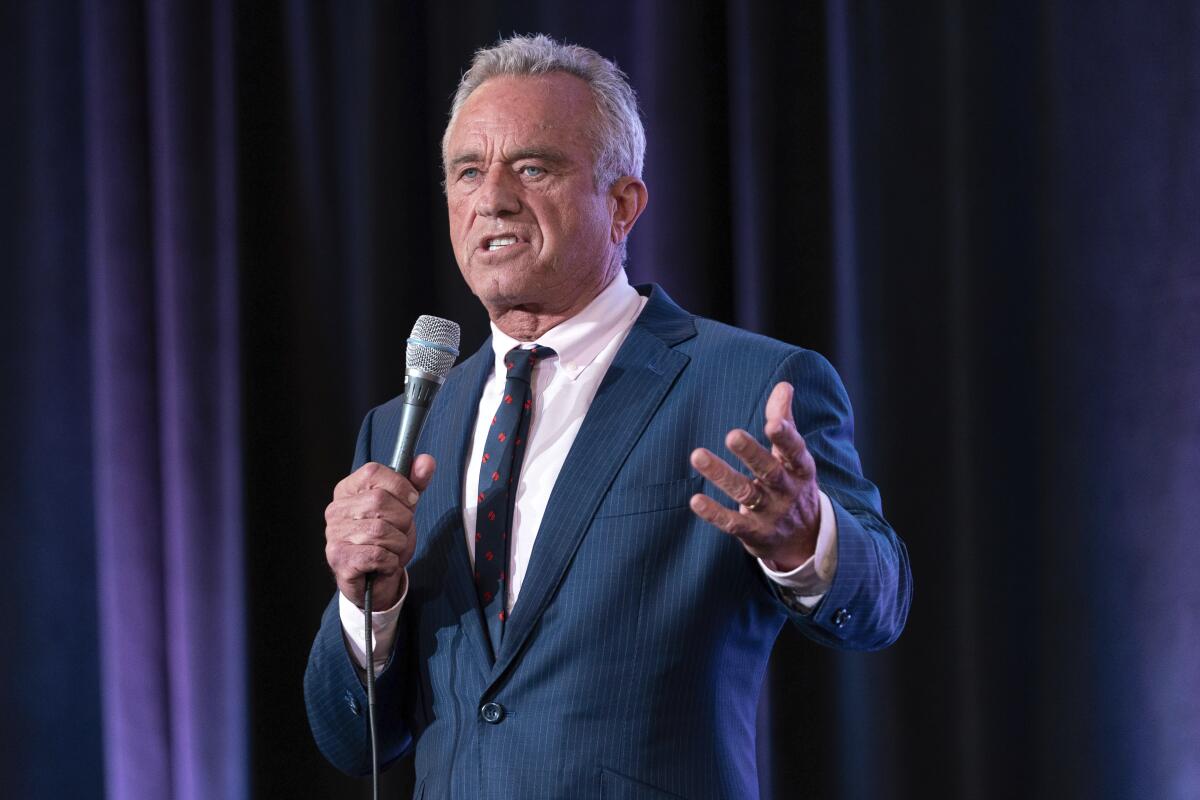Robert F. Kennedy Jr. files complaint over rules for CNNâs presidential debate next month

PHOENIX â Independent presidential candidate Robert F. Kennedy Jr. filed an election complaint Wednesday alleging CNN is colluding with Democratic President Biden and presumptive Republican nominee Donald Trump to exclude him from a debate the network is hosting next month.
Kennedy alleges that the requirements to participate in the June 27 debate were designed to ensure only Biden and Trump would qualify and that he is being held to a higher standard.
âCNN is making prohibited corporate contributions to both campaigns and the Biden committee and the Trump committee have accepted these prohibited corporate contributions,â a lawyer for Kennedy, Lorenzo Holloway, wrote in a letter to the Federal Election Commission.
CNN said the complaint was without merit.
RFK Jr., who recently qualified for the California ballot as a member of the American Independent Party, could draw votes from Biden and Trump.
Biden and Trump agreed this month to the CNN debate and a second on Sept. 10 hosted by ABC, bypassing the nonpartisan commission that has organized debates for nearly four decades. The first debate will come before Biden and Trump have been formally nominated by their parties this summer.
Kennedy has looked to the debates as a singular opportunity to stand alongside Biden and Trump, lending legitimacy to his long-shot bid and convincing people inclined to support him that he has a chance to win. Both the Biden and Trump campaigns fear he could play spoiler.
Kennedy still has time to meet the requirements, though the window is narrowing.
CNN has said candidates will be invited if they have secured a place on the ballot in states totaling at least 270 votes in the electoral college, the minimum needed to win the presidency, and have reached 15% in four reliable polls by June 20.
âIf I could sound better, I would,â says the presidential candidate, who has spasmodic dysphonia, a neurological condition that affects his vocal cords.
Kennedyâs campaign says he has submitted signatures or other paperwork to appear on the ballot in nine states â California, Delaware, Hawaii, Michigan, New Jersey, New York, Oklahoma, Texas and Utah â with a combined 171 electoral votes, though not all have affirmed his name will be listed. California, the largest prize on the electoral map with 54 votes, will not certify any candidates until Aug. 29.
âThe law in virtually every state provides that the nominee of a state-recognized political party will be allowed ballot access without petitioning,â a CNN spokesperson said in a statement Wednesday. âAs the presumptive nominees of their parties both Biden and Trump will satisfy this requirement. As an independent candidate, under applicable laws RFK Jr. does not. The mere application for ballot access does not guarantee that he will appear on the ballot in any state.â
Kennedy also hasnât met the polling criteria, the statement said.
Biden and Trump have easily cleared the polling threshold but wonât be certified for the ballot until their parties formally nominate them. Both have secured enough delegates to lock in their nominations.
Cooper writes for the Associated Press.
More to Read
Get the L.A. Times Politics newsletter
Deeply reported insights into legislation, politics and policy from Sacramento, Washington and beyond. In your inbox three times per week.
You may occasionally receive promotional content from the Los Angeles Times.












